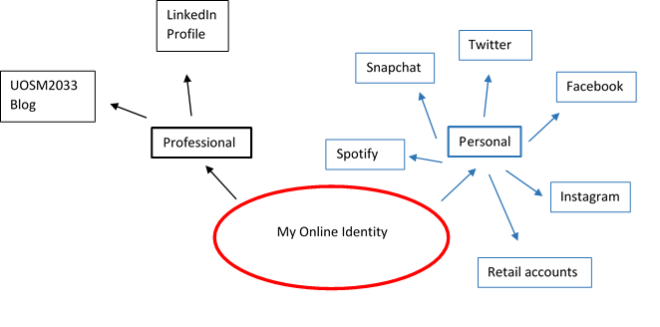“on the internet, no one knows you’re a dog”
(Krotoski, 2012)
To me, this phrase summarises the endless possibilities that the internet provides us with. The internet allows us to create as many social ‘identities’ as we want. Essentially, an online identity is the set of characteristics that define you online and make you distinguishable from other users. Each different representation of you online is known as a partial identity (internetsociety.org, 2016). I have illustrated mine below.

For many of us, an example of our online identity, would be our real life Facebook profiles. However, out of the 1.71 billion monthly active Facebook users (Noyes, 2016), how many of these are authentic? Profiles that are considered authentic, are tied to the account holders real name and they upload real life images of themselves. The television show Catfish springs to mind. Do you know for certain who you are talking to online? The presenters seek out fake social media profiles that are used to engage online relationships with ‘authentic’ users. This obviously raises a huge security issue.
However, the option to create an anonymous identity online can actually be a positive. One of my first thoughts on the topic was the organisation Anonymous.
This act against terrorism was only possible due to the anonymous nature of the hackers. If their real identities were used then they would have been targeted by ISIS. This shows in some instances, having more than one online identity, is actually extremely beneficial.
Perhaps, these are extreme examples. The reality for many users with multiple online identities is to establish boundaries between their personal and professional life. Warburton (2012) points out that having multiple identities means you can adopt a different persona, different levels and types of control and regulate your behaviour accordingly. A teacher may set up a Twitter page to interact with students and share topic related posts. This same teacher may also have a personal Twitter page, most likely set to private, to communicate with friends. There would be a huge difference in the content of these online identities, despite being linked to the same person.
For future thought, Casserly’s blog (2011) proposed that having so many partial identities actually affects you offline, making it extremely difficult to become a real person. The term ‘real’ used here is perhaps the problem. Offline, which identity actually are we? My only real response to this, is that each partial identity that we leave online is a representation of one side of our personality.
References:
ANONYMOUS (2016) Anonymous to strike back & severely punish ISIS after Brussels attack. Available at: https://www.youtube.com/watch?v=CqsOButT_PM (Accessed: 26 October 2016).
Internetsociety.org. (2016). Online Identity Overview | Internet Society. [online] Available at: http://www.internetsociety.org/online-identity-overview [Accessed 25 Oct. 2016].
Krotoski, A. (2012). Online identity: is authenticity or anonymity more important?. [online] the Guardian. Available at: https://www.theguardian.com/technology/2012/apr/19/online-identity-authenticity-anonymity [Accessed 24 Oct. 2016].
Noyes, D. (2016) Top 20 Facebook statistics. Available at: https://zephoria.com/top-15-valuable-facebook-statistics/ (Accessed: 27 October 2016).
Warburton, S. and Hatzipanagos, S. (2012) Digital identity and social media. Boca Raton, FL, United States: Information Science Reference.
Hi Hannah, especially enjoyed the contrast of “anonymous” and “catfish” in how having multiple or hidden identities can be good or bad respectively. Have you thought about the flip side of these statements, such as how anonymity can be used toward bullying or illegal activity such as the dark web? Or how people can create fake profiles in order to seek comfort when they are afraid to use their real avatar?
I also thoroughly agree with the closing comments relating to how “real” we can be in the offline world as well as on the internet. Is it worth considering that these sides of a persons identity could still be displayed on one “avatar” or profile?Your example of the teacher needing separate accounts is very relevant – I understand some jobs can require a level of personal discretion.
LikeLike
Hi Arthur,
Thankyou for the comment!
To be honest I hadn’t really touched over using anonymity for bullying or illegal activity very thoroughly in my research. After reading other people’s blog posts and leaving my own comments, I do think that both of these issues are present due to anonymity. I have witnessed hate comments on many celebrities social media accounts from either anonymous or fake profiles. I’m just not too sure how we can police this.
You are right, anonymity can provide a sense of comfort and allows users to perhaps express their views more comfortably. I do think the negatives such as bullying outweigh this though.
In response to whether a persons avatar can display all sides of a persons identity, I admit that my views have changed. Before UOSM2033 I only had personal accounts that I shared similar, if not the same, opinions and pictures. Therefore, my previous online identity I think would have incorporated the ‘real’ me. Since starting this blog, another side of my online identity has been shown. I also think that the new experiences I encounter in my life will only further this, for example when I get a job. My opinion on this now stands that if your profile displays your whole online identity then it’s incomplete and over time this will change. For example, perhaps for younger people.
LikeLike
Hi Hannah,
Very relevant point regarding the policing of anonymous profiles – surely it would be too costly to track IP addresses for a large amount of people but is this the only solution? Very interesting point regarding profile development. This has made me too question the appearance of profiles I have, such as Facebook, of which I’ve been a user for roughly 7 years! When I first started using it my activity was very different to how it is now, which can cause great entertainment to my friends, however I’m not sure it’s appropriate for prospective employers to view. A hurdle to be jumped in the near future.
LikeLike